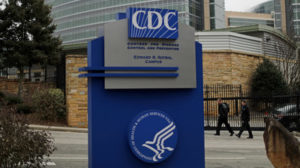Almost 40 years ago, a CDC report described mysterious pneumonia cases among five previously healthy young men in Los Angeles.
That led to reporting of similar cases — and the eventual identification of AIDS.

Since then, those same weekly CDC reports have published important articles on SARS, Ebola and Zika, among other major disease trends. And this year, many Morbidity and Mortality Weekly Report (MMWR) articles have presented updated research and critical health information about COVID-19.
But the MMWR, known as “the voice of the CDC,’’ has come under recent political pressure, according to media reports.
Politico and the Washington Post said last month that political appointees at the U.S. Department of Health and Human Services (HHS) have sought to change, delay and prevent the release of MMWRs about COVID-19 that they viewed as undermining President Trump’s message that the pandemic is under control.
In response, three former editors of the publication wrote an op/ed in the Journal of the American Medical Association recently, defending the integrity of the MMWR.
“MMWR really needs a firewall around it,’’ one of the authors, Dr. Sonja Rasmussen, said in a recent interview with Georgia Health News.
The articles, reviewed rigorously before publication, aim to inform physicians, researchers, public health officials and the general public about current disease patterns and other critical issues. Rasmussen, who retired from the Atlanta-based agency recently and is now at the University of Florida College of Medicine, said the MMWR “is revered within the CDC.’’
“It’s always stayed within the CDC,’’ free of influence by political appointees, she said.
The editorial concluded that “it has long been recognized that for the scientific reports of MMWR to be respected and trusted, they must be free of political influence.” Rasmussen’s two editorial co-authors were Dr. John Ward, with the Task Force for Global Health, based in Decatur; and Dr. Richard Goodman of Emory University School of Medicine.
Political influence on articles?
A month ago, Michael Caputo, at the time the top HHS spokesman, said he and an adviser, Paul Alexander, were seeking greater scrutiny of the MMWR, the Washington Post reported.
Alexander sent repeated emails to the CDC seeking changes and demanding that the reports be halted until he could make edits, the Post and Politico reported.
The CDC editorial staff producing the MMWRs typically send one-paragraph summaries to HHS and other CDC officials a few days before publication.

In one CDC report, which focused on hydroxychloroquine, the MMWR urged clinicians to follow long-accepted prescribing guidelines for the malaria drug. Trump promoted the drug as a coronavirus treatment despite little evidence that it worked. The report had been delayed for weeks, according to a former administration official with direct knowledge of the efforts, the Post reported.
And an MMWR report about COVID-19 spread at a Georgia sleep-away camp was also delayed, the former official said. That report, issued July 31, suggested that children of all ages are susceptible to coronavirus infection and may spread it to others — a finding likely to intensify the debate about the risks of sending children back to school, the Post reported.
Caputo at one point accused CDC scientists of “sedition” and falsely claimed they had formed a “resistance unit” against Trump, according to The New York Times. Caputo later apologized, and has taken a medical leave from HHS.
Reversing some advice
Dr. Sarita Shah, a former CDC official who’s now with Emory, has had articles published in the MMWR, including one on drug-resistant tuberculosis, and on COVID testing in long-term care facilities.
The weekly reports provide updated information “to anyone caring for patients,’’ said Shah, associate professor of global health, epidemiology and infectious diseases at Emory’s Rollins School of Public Health. “I was really shocked and really disturbed’’ by reports of political interference.

“It’s really important to maintain the independence and the integrity of the MMWR.”
But the MMWR is just one area of controversy engulfing the world’s leading public health agency.
The CDC drew sharp attacks after posting guidance that said people didn’t necessarily need to get tested if they didn’t feel sick. The agency later reversed that position.
The agency also abruptly removed from its website guidance saying that the coronavirus spreads via aerosols, drawing a fresh barrage of criticism. That guidance on aerosols has been restored recently.
And a renowned epidemiologist and former CDC director, Dr. William Foege, wrote a letter to the agency’s current chief, Dr. Robert Redfield, urging him to expose the failed U.S. response to the coronavirus.
Foege, who led the eradication of smallpox, called on Redfield to openly address White House meddling in the agency’s efforts to manage the COVID-19 crisis, then accept the political sacrifice that would follow.
Reputation and morale
Former CDC officials interviewed by Georgia Health News said they fear the reputation of the agency has eroded amid the fray.
One former CDC employee, Amber Schmidtke, a microbiologist, said morale at the agency “is really being hurt.’’

“What I worry about is we’re seeing a brain drain’’ from the CDC and public health agencies, with departures of key people, she said.
“People may not have taken time off during the pandemic,’’ said Schmidtke, who now tracks Georgia COVID trends in the publication Daily Digest. “Burnout is accumulating.’’
The MMWR, she added, is “one of the real gems of public health, presenting data you can put into action right away.’’ In a pandemic, Schmidtke said, “we really need access to that lighthouse of information more than ever. People can make decisions on going to restaurants or sending their kids to school.’’
Rasmussen said CDC personnel “are very smart and incredibly dedicated people. They’re in a very challenging position. I think morale is understandably challenged right now.’’
“I’m hoping [the CDC’s reputation] will rebound,’’ Rasmussen added. “We need the CDC more than ever.’’

